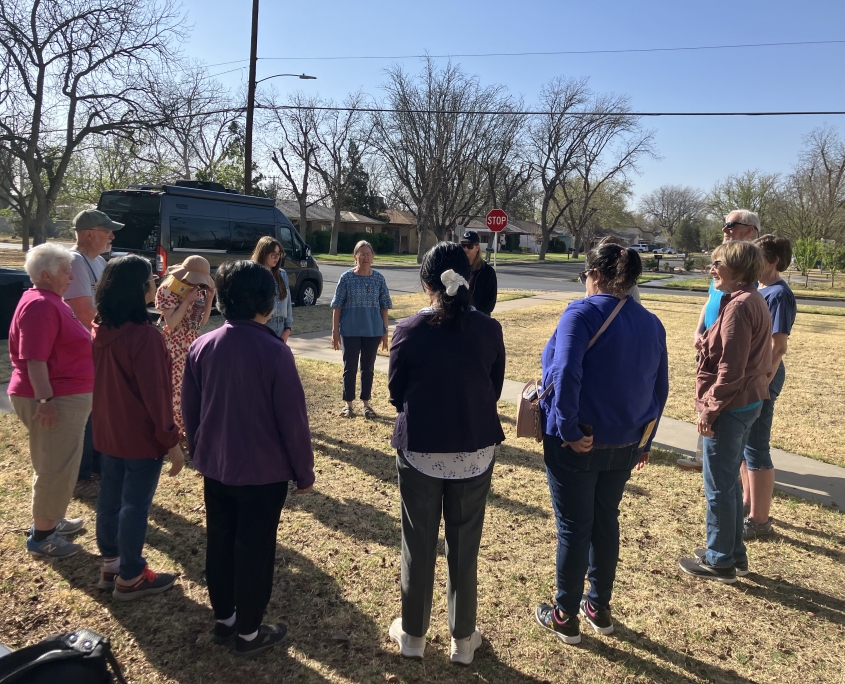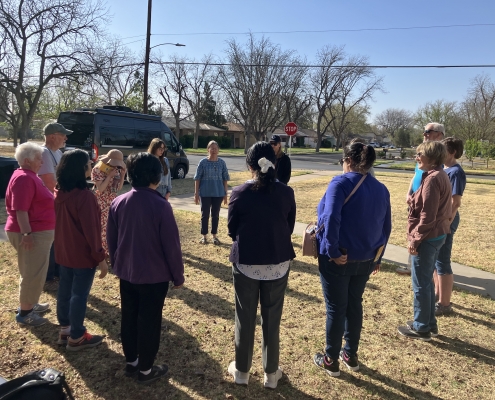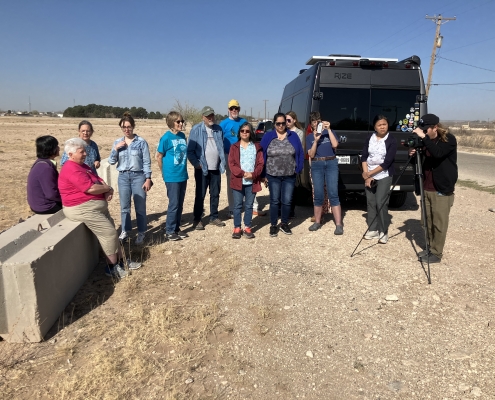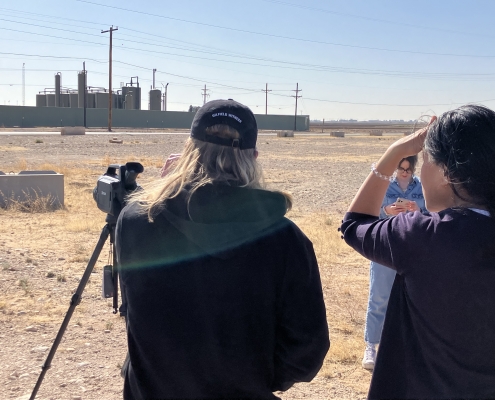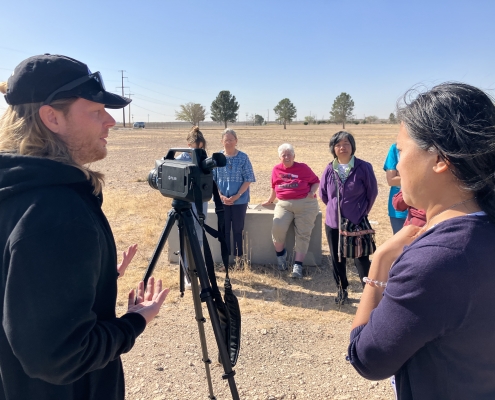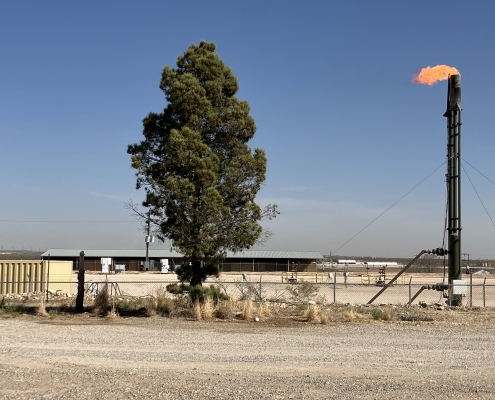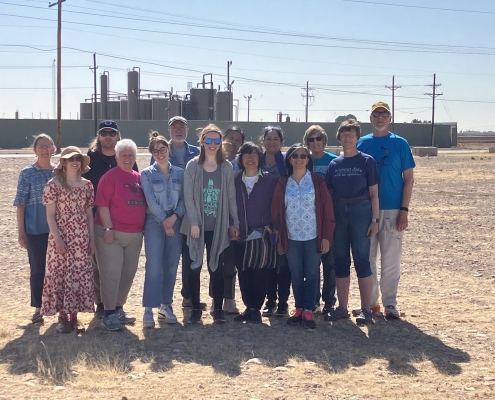Pope Francis Reflection, by Joan Brown, osf
Franciscus. One word. A name. Pope Francis’ request was that only one word be inscribed on his tomb and that he be buried in Sister Mother Earth. The beloved world leader of the worldwide Catholic Church died Easter Monday, April 21, 2025 after serving as pope since 2013. Franciscus means “free one” and is the name of St. Francis of Assisi, who lived a humble life, loving all people and creatures as brothers and sisters. He is the Patron Saint of Ecology.
Pope Francis embodied his name “the free one” and his life reflected that of St. Francis of Assisi, who is also the Patron Saint of Santa Fe. Only one who knows their essence and souls call is free to live and speak regardless of controversy. The encyclical or teaching document Laudato Si: On Care of Our Common Home, published in 2015, raised the ire of many by calling for radical action on climate change which he linked with economics and ecological injustice around the globe.
When Laudato Si was published, Interfaith Power and Light (IPL) in New Mexico held an interfaith press conference to share more broadly this document that was intended for All People. We invited the Muslim director of the Dialogue Institute, Necip Orhan (who later became a board member of IPL) and Jewish, Protestant and Catholic leaders to speak. I remember Necip in particular because he was nearly the only person who had read the entire document, a testament to its universality and importance.
As 2015 progressed other world religions published important climate documents and letters that converged in a strong spiritual, ethical and moral call to address climate change, the largest ethical and moral challenge of our time. When I attended the United Nations Conference of Parties or COP21 in Paris later in the year, the leaders of the COP spoke to religious leaders and said that an agreement would happen because of two things. Climate change was increasing rapidly as a threat and because of the leadership of World Religious leaders and the document Laudato Si.
The 2015 Paris Agreement is a landmark and not perfect international treaty on climate change that was signed by 195 nations. While it is non-binding it is a very important agreement by the world to work toward limiting global warming to below 2 degrees Celsius utilizing country goals and accountability known as Nationally Determined Contributions.
The leadership of religious and spiritual groups leading up to the COP and following is important. Pope Francis spoke of climate change as a spiritual crisis. While technology will assist in addressing this overwhelming challenge, it is not the answer. A shift in worldview and the understanding of what it means to be a human being is required.
He also lifted up the necessity of interrelationships and an “integral ecology” that we came to know even more poignantly during COVID and Black Lives Matter. Interrelationships enabled Francis to see that “we are not faced with two separate crises, one environmental and the other social, but rather one complex crisis which is both social and environmental.” As a result, “Strategies for a solution demand an integrated approach to combating poverty, restoring dignity to the excluded, and at the same time protecting nature.” In such an “economic ecology,” the protection of the environment is then seen as “an integral part of the development process and cannot be considered in isolation from it.”
His life modeled this understanding addressing the question again and again “What does it mean to be human?” Living an ordinary life in community with others and not being isolated in a palace, saying mass each day with the workers where he lived, washing the feet of prisoners on Holy Thursday, helping refugees find homes and befriending everyone were his life. We all have blind spots and an understanding of women’s voice, leadership, and role in the church and world was one. I still believe Laudato Si would have been much stronger and more universal had it lifted up climate change, at least in part through the eyes of women and called for recognition of the need for their leadership in decision making circles. But, there were many other controversial areas that he met with compassion, insight, and courage.
Laudato Si was not the only effort to address ecological threats. He called The Amazon Synod in in 2019 to address environmental and religious issues in the Amazon region with a particular focus upon indigenous communities. Laudate Deum or “Praise God for All Creatures” was published on the feast of St. Francis, October 4, 2023 to follow up on Laudato Si because “With the passage of time, I have realized that our responses have not been adequate, while the world in which we live is collapsing and may be nearing the breaking point. In addition to this possibility, it is indubitable that the impact of climate change will increasingly prejudice the lives and families of many persons” (2). Even stronger than Laudato Si this exhortation calls out industries responsible for growing carbon emissions.
Several meetings were held at the Vatican with high level leaders of the oil and gas industry throughout his time as Pope. A promoter of renewable energy, he had solar panels installed at the Vatican and in 2024 published a letter “Brother Sun” encouraging more solar and renewable energy. Numerous Catholic organizations including Catholic Climate Covenant and Laudato Si movement, working with the Vatican to engage the 1.2 billion Catholics around the world to address lifestyle changes with energy efficiency, solar, and soil and water work.
As we mourn a beloved world religious leader whose humble life touched so many and challenged systems and the status quo we are invited to reflect upon our own lives. St. Francis of Assisi had a profound invitation to his followers at the end of his life, “I have done what is mine to do. May Christ teach you what is yours.”
I invite us into a contemporary reflection for people of all and no faith traditions that echoes St. Francis, but is from Pope Francis, Laudato Si: On Care of Our Common Home paragraph 160.
“What kind of world do we want to leave to those who come after us, to children who are now growing up? This question not only concerns the environment in isolation; the issue cannot be approached piecemeal. When we ask ourselves what kind of world we want to leave behind, we think in the first place of its general direction, its meaning and its values. Unless we struggle with these deeper issues, I do not believe that our concern for ecology will produce significant results. But if these issues are courageously faced, we are led inexorably to ask other pointed questions: What is the purpose of our life in this world? Why are we here? What is the goal of our work and all our efforts? What need does the earth have of us? It is no longer enough, then, simply to state that we should be concerned for future generations. We need to see that what is at stake is our own dignity. Leaving an inhabitable planet to future generations is, first and foremost, up to us. The issue is one which dramatically affects us, for it has to do with the ultimate meaning of our earthly sojourn.”

